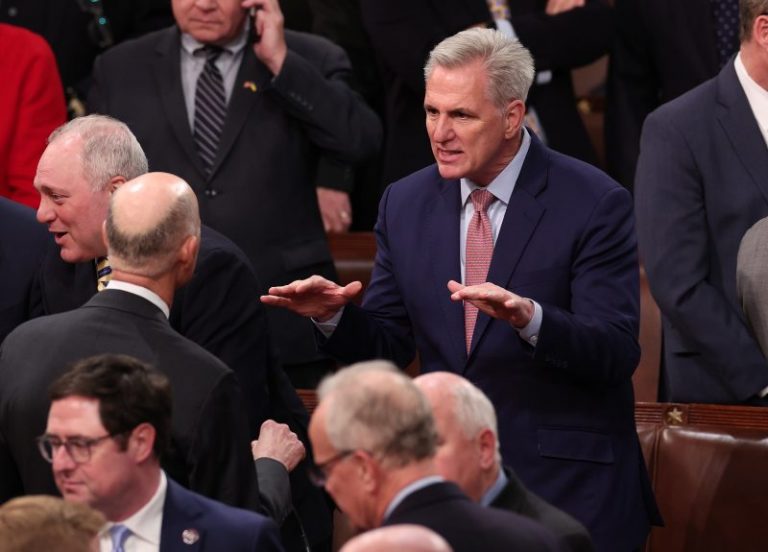Shortly before the 2022 election, now-House Speaker Kevin McCarthy (R-Calif.) issued a striking warning: Were Republicans to win control of Congress, Ukraine might not be able to count on the United States’ continued financial support.
At the time, we and others noted that this statement might have had the dual purpose of nudging Democrats to increase the funding while they still had power. And they obliged: Congress included about $45 billion in Ukraine funds in the year-end omnibus spending bill — the largest sum to date and even more than the Biden administration had asked for.
But it’s likely not the last time Congress will face this issue. And the debate over its next steps may be contentious, given that polls show the GOP continuing to turn against sending money to Ukraine.
A new CBS News/YouGov poll this week — the first to test the issue since Ukraine President Volodymyr Zelensky spoke before Congress in December — is the latest to illustrate that drift. And despite Zelensky’s plea for American resolve, it shows that a slight majority of Republicans want their member of Congress to oppose further Ukraine funding, by a 52 percent to 48 percent margin.
But it’s hardly the only signifier of this shift.
When the war started, this was a very bipartisan issue. Then the percentage of Republicans who said we were doing “too much” to help Ukraine grew sharply, from the single digits shortly after the war began in February to 48 percent in a Wall Street Journal poll released shortly after McCarthy’s comments. Multiple polls released after the election — from Marquette University law school and Fox News — showed a plurality of Republicans said we were doing “too much,” rather than the right amount or not enough.
But saying we should do less isn’t the same as saying we should do nothing. And now a significant number of Republicans say that’s their position.
In addition to the CBS/YouGov poll, a poll conducted for the Chicago Council on Global Affairs in November showed 55 percent of Republicans saying the United States should provide military aid (down from 80 percent in March and 68 percent in July), and 50 percent saying we should provide economic assistance (down from 74 percent in March and 64 percent in July).
What the polls have also shown — and is likely related to the declining numbers — is more pessimism among Republicans about Ukraine’s ability to win the war and more desire to make concessions to Russia in the name of ending it.
The Chicago Council poll offered respondents a choice between supporting Ukraine for as long as it took and urging a deal “even if that means Ukraine will lose some territory.” Republicans preferred the latter by a 63-33 margin. That’s a reversal from November, when they favored the as-long-as-it-takes option by a narrow 50-46 margin.
The reactions of prominent Republicans have been just as revealing. As opposition to funding Ukraine has grown, leaders have been rather quiet about trying to combat it. Both McCarthy and now-House Majority Leader Steve Scalise (R-La.) have spoken about the matter rather dispassionately, emphasizing that how the money is spent should be scrutinized. Meanwhile, members like Rep. Marjorie Taylor Greene (R-Ga.) have begun pushing for cutting off the funding in the name of focusing on domestic issues like the Southern border. Some Republicans either skipped Zelensky’s speech or attended but made a show of not applauding him.
Senate Minority Leader Mitch McConnell (R-Ky.) is something of an exception to the hands-off approach. He has claimed supporting Ukraine is most Republicans’ “number one priority,” and has argued that supporting Ukraine is in America’s interest, because it means combating Russia’s influence on the world stage without risking American lives.
It’s a potentially compelling argument, but one that relatively few Republicans have ventured as their party has drifted toward a noninterventionist, inward-facing posture.
But the real battle, to the extent it exists, is likely to take place in the House. And perhaps the tacks of McCarthy and Scalise, emphasizing general fiscal accountability and opposing an open-ended commitment to Ukraine, may turn out to be a successful strategy for ultimately securing some amount of aid in the future.
But we’ve also seen how the noisier wing of the party often gets what it wants — or at least leverages things in its favor. And the noisier half increasingly opposes further Ukraine funding.
Congress delayed the next debate over this issue by sending $45 billion during the lame-duck session. But whenever it comes around again, it could be one of the most substantial and potentially divisive ones we’ll see over the next two years, with enormous real-world consequences.

